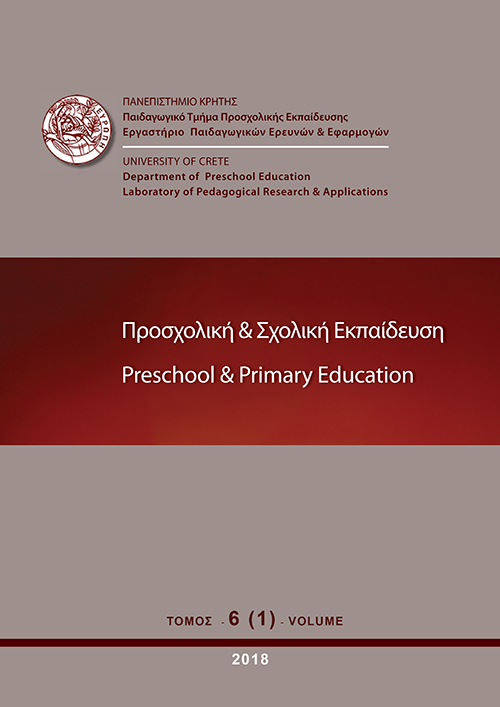Generalizations, overgeneralizations and intercultural communication: The stereotype of the Greek nation at commemorative ceremonies in schools.
Abstract
This paper has a double aim: (a) to approach a stereotype of the nation as overgeneralization and obstacle to intercultural communication and (b) to suggest ways to start to “escape” from stereotypical thinking. The first aim is pursued through a comparison between two conceptualizations of the level of “programming” of the human mind: (a) Hofstede’s model of the “software” of the human mind and (b) a stereotype of the Greek nation widely used in schools, as it is presented in the literature. Both constitute theories of the patterns of thinking, feeling and potential acting among the members of nation. The first (scientific) theory is explicitly articulated on three levels: individual, group and human nature. The stereotype of the nation may be viewed as a folk theory. Meant to serve the management of everyday life, it does not have to be explicitly formulated or satisfy the requirements of a scientific theory. The school stereotype was subject to thematic analysis. The comparison suggests that this national stereotype tends to abolish the lines that, In Hofstede’s schema, keep the levels of mental programming clearly separate. As a result, the stereotype constitutes an overgeneralization. As such, it is viewed as an obstacle to successful intercultural communication. Thus, I argue for the need of critical self-examination as the means of acquiring awareness of our stereotypes. To this purpose, a few “techniques” and a brief overview of relevant literature.
Article Details
- Zitationsvorschlag
-
Benincasa, L. (2018). Generalizations, overgeneralizations and intercultural communication: The stereotype of the Greek nation at commemorative ceremonies in schools. Preschool and Primary Education, 6(1), 73–94. https://doi.org/10.12681/ppej.14896
- Ausgabe
- Bd. 6 Nr. 1 (2018)
- Rubrik
- Άρθρα

Dieses Werk steht unter der Lizenz Creative Commons Namensnennung - Nicht-kommerziell - Weitergabe unter gleichen Bedingungen 4.0 International.
Οι συγγραφείς των άρθρων που δημοσιεύονται στο ΠΡΟΣΧΟΛΙΚΗ & ΣΧΟΛΙΚΗ ΕΚΠΑΙΔΕΥΣΗ διατηρούν τα δικαιώματα πνευματικής ιδιοκτησίας επί των άρθρων τους, δίνοντας στο περιοδικό το δικαίωμα της πρώτης δημοσίευσης. Άρθρα που δημοσιεύονται στο ΠΡΟΣΧΟΛΙΚΗ & ΣΧΟΛΙΚΗ ΕΚΠΑΙΔΕΥΣΗ διατίθενται με άδεια Creative Commons 3.0 και σύμφωνα με την άδεια μπορούν να χρησιμοποιούνται ελεύθερα, με αναφορά στο/στη συγγραφέα και στην πρώτη δημοσίευση για μη κερδοσκοπικούς σκοπούς και με δικαίωμα τροποποίησης μόνον με παρόμοια διανομή (αν αναμείξετε, τροποποιήσετε, ή δημιουργήσετε πάνω στο υλικό, πρέπει να διανείμετε τις δικές σας συνεισφορές υπό την ίδια άδεια όπως και το πρωτότυπο). To Εργαστήριο Παιδαγωγικών Ερευνών και Εφαρμογών του Παιδαγωγικού Τμήματος Προσχολικής Εκπαίδευσης του Πανεπιστημίου Κρήτης και το Εθνικό Κέντρο Τεκμηρίωσης διατηρούν το δικαίωμα να δημοσιεύουν, να αναπαραγάγουν, να παρουσιάζουν στο κοινό, να διανέμουν και χρησιμοποιούν άρθρα που δημοσιεύονται στο ΠΡΟΣΧΟΛΙΚΗ & ΣΧΟΛΙΚΗ ΕΚΠΑΙΔΕΥΣΗ σε οποιοδήποτε μέσο και μορφή είτε μεμονωμένα είτε ως μέρη συλλογικών έργων, για όλο το χρόνο διάρκειας προστασίας της πνευματικής ιδιοκτησίας και για όλες τις χώρες του κόσμου. Αυτό περιλαμβάνει ενδεικτικά και όχι αποκλειστικά, το δικαίωμα δημοσίευσης των άρθρων σε τεύχη του περιοδικού ΠΡΟΣΧΟΛΙΚΗ & ΣΧΟΛΙΚΗ ΕΚΠΑΙΔΕΥΣΗ, αναπαραγωγής και διανομής μεμονωμένων αντιγράφων των άρθρων, αναπαραγωγής ολόκληρων των άρθρων σε άλλη έκδοση του Εργαστηρίου Παιδαγωγικών Ερευνών και Εφαρμογών του Παιδαγωγικού Τμήματος Προσχολικής Εκπαίδευσης του Πανεπιστημίου Κρήτης και του Εθνικού Κέντρου Τεκμηρίωσης και αναπαραγωγής και διανομής των άρθρων ή περίληψης αυτών με χρήση πληροφορικού συστήματος αποθετηρίου.



